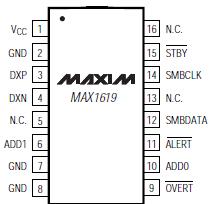Features: ` Two Channels Measure Both Remote and Local Temperatures
` No Calibration Required
` SMBus 2-Wire Serial Interface
` Programmable Under/Overtemperature Alarms
` OVERT Output for Fan Control
` Supports SMBus Alert Response
` Supports Manufacturer and Device ID Codes
` Accuracy
±2°C (+60°C to +100°C, local)
±3°C (-40°C to +125°C, local)
±3°C (+60°C to +100°C, remote)
` 3A (typ) Standby Supply Current
` 70A (max) Supply Current in Auto-Convert Mode
` +3V to +5.5V Supply Range
` Write-Once Protection
` Small 16-Pin QSOP PackageApplication·Desktop and Notebook
·Central Office
·Computers
·Telecom Equipment
·Smart Battery Packs
·Test and Measurement
·LAN Servers Multichip
·Modules
·Industrial ControlsPinout Specifications
SpecificationsVCC to GND.......................................................-0.3V to +6V
DXP, ADD_ to GND ..............................-0.3V to (VCC + 0.3V)
DXN to GND ..................................................-0.3V to +0.8V
SMBCLK, SMBDATA, ALERT, OVERT
STBY to GND.....................................................-0.3V to +6V
SMBDATA,ALERT, OVERT Current..................-1mA to +50mA
DXN Current ...............................................................±1mA
ESD Protection (all pins, Human Body Model) ............2000V
Continuous Power Dissipation (TA = +70°C)
QSOP (derate 8.30mW/°C above +70°C)...............667mW
Operating Temperature Range ................-55°C to +125°C
Junction Temperature...............................................+150°C
Storage Temperature Range ....................-65°C to +150°C
Lead Temperature (soldering, 10sec) ......................+300°C
Stresses beyond those listed under "Absolute Maximum Ratings" may cause permanent damage to the device. These are stress ratings only, and functional operation of the device at these or any other conditions beyond those indicated in the operational sections of the specifications is not implied. Exposure to absolute maximum rating conditions for extended periods may affect device reliability.
DescriptionThe MAX1619 is a precise digital thermometer that reports the temperature of both a remote sensor and its own package. The remote sensor is a diode-connected transistor-typically a low-cost, easily mounted 2N3904 NPN type-that replaces conventional thermistors or thermocouples.Remote accuracy is ±3°C for multiple transistor manufacturers, with no calibration needed. The remote channel can also measure the die temperature of other ICs, such as microprocessors, that contain an on-chip,diode-connected transistor.
The 2-wire serial interface accepts standard System Management Bus (SMBus®) Write Byte, Read Byte, Send Byte, and Receive Byte commands to program the alarm thresholds and to read temperature data. The data format is 7 bits plus sign, with each bit corresponding to 1°C, in two's complement format. Measurements can be done automatically and autonomously, with the conversion rate programmed by the user or programmed to operate in a single-shot mode. The adjustable rate allows the user to control the supply-current drain.
The MAX1619 is nearly identical to the popular MAX1617A,with the additional feature of an overtemperature alarm output (OVERT) that responds to the remote temperature; this is optimal for fan control.

 MAX1619 Data Sheet
MAX1619 Data Sheet







